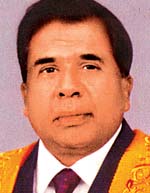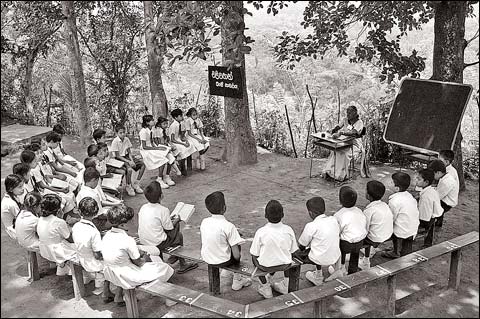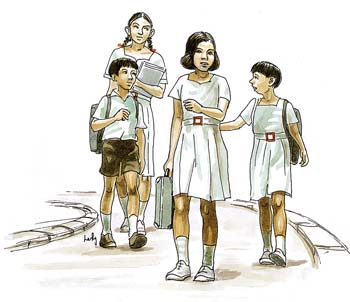Education, discipline and poverty
Text of the speech by Prof Dayananda
Somasundara at the felicitation ceremony held to appreciate 40 years
service to the education field by him at Sabaragamuwa University
What is education? Education is anything that develops mentality,
character and physical skills. Education is a continuous process. It is
the communication of knowledge, skills and values from one generation to
another. The word education evolves from the Latin word Educare-Educere,
which means bringing out skills from a person. This is what is expected
from education.
In our schools most of the mottos symbolise the value of education.
Vidya Dadathi Vinayang knowledge creates discipline. Vijja Uppathathan
Setta - From all things born, knowledge or education is the greatest.
Naththa Panna Sama Abaa - Nothing is equal to the glow of wisdom are
some of the mottos we are familiar with, Education is invaluable. Today,
all of you are gathered here, as you were able to make use of education
for the betterment of your life.
Value of education
|
True product of
free education system
* Senior Professor of Economics
and Statistics, Sabaragamuwa University
* Arts and Social Sciences Faculty Dean, Gombe State University,
Nigeria
* Born in Kalawana of Ratnapura District on September 11, 1946
* Entered Vidyodaya University in September 1965
* Master’s Degree in Economics at New England University,
Australia |

Prof Dayananda Somasundara |
President Barak Obama’s statement on education, in his Easter Speech
2010 is indeed important to all of us. He said, “Education is valuable.
We also know that ultimately, education is about something more,
something greater.
It is about the ability that lies within each of us to rise above any
barrier, no matter how high; to pursue any dream, no matter how big. If
our dreams came true and our hopes fulfilled that it because of our
education.” Education is the key to my success. I was born in a rural
village near the Sinharaja forest.
At some times our village was attacked by wild elephants at night.
But it was a beautiful village. Since my father was educated to a
certain level he always knew the value of education. In my village there
were children who didn’t go to school. There were a lot of children who
left school after primary classes.
My father’s understanding about the importance of education was one
of the reasons, sometimes the basic reason for my success in education.
When I was only five years old, I walked three miles to my primary
school. Even with great difficulty I went to school simply because my
parents forced me to do so. There were days when I bluffed going to
school.
I was admitted to a new school as soon as my father came to know of
this problem. At this school my desire to go to school and the interest
to study grew day by day and I was able to pursue my studies well.
Again, I had to join my first school Kalawana Senior School at Grade
three.
Scholarship exam
The dedication and the love of my teachers helped me to do well and I
was lucky to pass the Fifth Standard Government Scholarship exam in
1957.
During that time only children from families below a certain income
level got the opportunity to sit for the scholarship exam. My father’s
income at that time was not up to the level prescribed by the
government. Therefore, I am happy that I was not born to a rich family.
At that time, it was compulsory to enter the nearest central school
if you pass the scholarship exam.
There was Central School in each electorate. To me, the nearest
central school was Karawita Central College. I entered that school and
later joined the Ratnapura Sivali Central College to study in GCE
Advanced Level.
Right to education
Everyone has a right to get educated. This right was adopted with the
introduction of free education in 1938. Right to education was adopted
in European countries during 1966. In that aspect, Sri Lanka was one of
the pioneers to adopt free education. We should be grateful to Dr C W W
Kannangara, the Education Minister at that time, for introducing free
education system in Sri Lanka. The Central school system was also a
concept of Dr Kannangara.
Dr C W W Kannangara had a dream similar to what Martin Luther King
had. The famous speech of Martin Luther King, the Black Leader of United
States titled ‘I have a dream’. This was a 17 minute speech made on
racial discrimination. What is this dream? ‘The sons of former slaves
and the sons of former slave owners will be able to sit down together at
the table of brotherhood.’ Though he was murdered by a white man, his
dream became true.
|

Everyone has a right to education. File photo |
Barak Obama who has a black origin became the first black President
in United States. Similarly, Dr Kannangara had a dream that rural poor
children will sit with urban rich children at one table as brothers. One
day they will compete with urban elite’s children in education and
employment. Though he was defeated at the next general election, his
dream has become true today.
During that time lot of village children learnt English at Central
Schools. I am stressing on Central Schools system because I believe that
is the most appropriate education system for Sri Lanka. Those days,
Central Schools had only from Grade six. Talented students who passed
the Grade Five Scholarship Examination or entrance examination got the
opportunity to study at Central Schools. Until the Swabasha medium
(mother tongue) was introduced as the medium of education, Central
School classes were conducted in English. This was instrumental in
getting jobs for the students from villages.
Swabasha medium
I am not against the Swabasha medium or Sinhala being the national
language, but both these policies were implemented to satisfy political
agendas and not for the welfare of the country’s education or the
economy. The students from the village, be it Sinhala, Tamil or Muslim,
all were denied of learning English because of this policy. After that
English became a language of the well to do.
During this time, in universities, English was called Kaduwa (sword)
since ignorance of English language could cut you out from the society.
We can pronounce any language in the world. Why don’t we take that
ability out? Our students have the capability to learn the language but
why aren’t we providing them sufficient facilities to study?
After the medium of instructions was changed a lot of village
students in Central Schools lost the opportunity to study in the English
medium. As a result, there was a drastic decline in scholars of English
while the young educated in the villages had to face a lot of problems
after studying in indigenous languages. But some managed to succeed in
life by learning English on their own.
Educational reforms
|
Education |
Anything that
develops mentality, character and physical skills of a person
Continuous process, invaluable and creates discipline
Communication of knowledge, skills and values from one
generation to another
Educare-Educere, means
bringing out skills from a person
Introduction of free education in 1938
Central school system, a concept of Dr Kannangara |
With the mother tongue concept, today parents have to enroll their
children in private tuition classes or International Schools in order to
teach them English. International Schools have today expanded to the
village level too. But only the privileged class that can afford to can
benefit form it. However, I am happy that these schools are established
in villages too. But this will not make English education a public
facility that anyone can acquire. But something is better than nothing.
During the past years, with the educational reforms, the central
school system died away. Schools’ name boards were changed from time to
time, Maha Vidyala, Madya Maha Vidyalaya, Cluster Schools, National
Schools etc. Though the name boards changed no positive change was
visible.
Our children are being taught English from the primary classes. But
how many of these children who leave schools after 10 to 12 years can
speak English fluently? Is it a fault of our teachers or is it the fault
of the education system? Why aren’t the authorities concerned on this
issue?
Not only when Sir Lankans go to China, Japan, Russia or any other
foreign country they learn that foreign language within six to 12 months
but also they manage to write a thesis in English and obtain their
Masters of PhDs. Japanese volunteers and teachers who come to Sri Lanka
for voluntary work or to teach Japanese learn Sinhalese within three to
six months. There is something wrong with our way of teaching English.
Our education authorities should find a solution for this. This will be
the only way we can take village children to higher levels in the
society.
I suggest that we should go back to Dr Kannangara’s Central School
system and establish a good Central School in each Secretarial Division
with all necessary facilities. Setting up students’ hostels in these
schools and enrolling the students who pass the scholarship or entrance
exam and the outstanding students of the other areas would upgrade the
system. Let the subject knowledge be given with a good education in
English. These schools can limit their classes from Grade six upwards.
This will enable the talented students of the villages to get a better
education. The rush for popular schools may be minimized with this
system.
English medium
Some countries, even after colonization, maintained English as their
medium of education. Some of them retained English for education even
though national languages became the State language. This helped the
students of these countries to secure local and international jobs
easily.
There was a very high level of English in Sri Lanka and as result we
had a good civil service in Sri Lanka. There was a Sri Lankan professor
in the University I studied in Australia. Australian Professors came to
him to get his editorial assistance. In Nigeria I met a scholar who
studied from Sri Lankan teachers during 1970-1980. They highly
appreciate those Sri Lankan teachers for their good teaching qualities.
Presently a person who holds high ranks of professions still remembers
the days they learnt from Sri Lankan teachers.
Sri Lankan professors had worked in universities in Nigeria. Upto
today Nigerians still appreciate their service. When I visited Singapore
I saw that there is a street called ‘Ceylon Street’. I asked them why
they call it the Ceylon Street. They told me that during 1950s and 1960s
engineers and technicians where brought from Sri Lanka to build roads
and for other construction purposes.
Apart from this, Sri Lankan teachers and clerks had worked there.
Most of them later settled in this street. That was the reason behind
calling this street ‘Ceylon Street’. These Sri Lankans were able to find
good jobs as a result of their convertibility in English. Today we send
unskilled workers to Singapore and Middle East countries. In the past,
Singaporeans worked under Sri Lankans.
Today unskilled workers from Sri Lanka work under them. We indeed
respect these employees’ service and the foreign exchange they earn for
the country. But who created this upheaval? Isn’t it the failure of our
education system and the country’s politics? This provides evidence for
the negative impact of the downfall of the English education.
External courses
If English education was not ruined over the late years we would have
been able to create Sri Lankans capable enough to teach English to White
people. I had an understanding about the deficiency of English education
in youth. At the beginning of the Sabaragamuwa Affiliated University
College, when I was given the option to choose medium of instructions I
had chosen English medium.
Some Affiliated Universities decided to conduct courses in Sinhala
and some in Tamil. I introduced external course in English for the
students in the area. I feel that I fulfilled my duty to the children of
the village by uplifting their English language skills. The degree
holders of this University today can compete with any degree holder from
any other university in Sri Lanka. In some cases they are ahead of
certain degree holders in other universities.

Today’s world is developed with knowledge, economy and information
technology. Due to the use of computers and Internet, English has become
an essential skill. I do not expect anyone to become a slave to English
or English to overpower us.
We should not make English our master but our servant. We can make
use of it. Our people have a good capacity to absorb anything.
Therefore, showing them the path would be enough. Just as Malani
Bulathsinghala sings in her song if you go to a betting booth (race
bookie) you will find people with no education reading the race sheets.
They can read the names of the horses and the names of the jockeys. They
mange to write the names of the horses in proper English. I sometimes
wonder how well they would do if they were properly taught English.
Recently the government has set up English medium classes in Sinhala
schools to overcome the deficiency of knowledge in English. What I
believe is that English language and literature subjects should be made
compulsory than teaching every subject in English. Finding qualified
teachers is another problem. I introduced a course in English at the
Sabaragamuwa University with the vision of producing English teachers to
fill in these vacancies. Today all over the island there are English
teachers graduated from the Sabaragamuwa University.
You all may wonder whether education is all about English since I
emphasized on English Language. There is another subject in the Sri
Lankan education system that we need to give importance to. Second
language is also important. Tamil should be made compulsory to Sinhala
medium students and Sinhala should be made compulsory to Tamil medium
students as their second language.
I tried out this strategy successfully in the Sabaragamuwa
University. This was useful to both Sinhala and Tamil medium students.
Unfortunately, this policy has been over ruled after my tenure of office
of Vice Chancellor. Studying your neighbour’s language is important in a
multi-ethnic society.
Apart from knowledge in languages, the discipline that education
creates is also important. What is education? Anything that will develop
a person’s character, mentality and physical skills comes under
education. Discipline is also a part of education. Vidya Dathathi
Vinayang also means this.
Economists categorise the factors that are essential for the
production in a country; land or natural resources, capital, labour and
entrepreneurship. Let me add good behaviour, honesty and dedication to
those categories. In the developed countries we see these qualities.
Though at initial stages there were tight laws and regulations,
gradually these have become a part of their culture. How did Singapore
develop to such a State? What are the resources they had? Nothing. Lee
Quan Yu gave importance to build up good behaviour, honesty and
dedication in the people of his land. Singapore is being considered the
most disciplined country in the world.
Japan is also a country that developed with dedication and honesty of
people. Dubai which is in middle of the desert has become one of the
developed countries of the world with their strict discipline. Where
good behaviour, honesty and dedication fade away from a society the
development diminishes. The vision of the Sri Lankan education system
should be to create a future generation embossed with good behaviour,
honesty and dedication. The economist. Ragnar Nurkse has said ‘a country
is poor because it is poor’. I would like to change this statement
‘countries are poor in income because they are poor in discipline.’
Working hours
What can we expect from a country without discipline? It is only
corruption and waste. Our country was an example to Singapore during
1940s- 1950s. Today, we are in a state to make Singapore as our example.
But we don’t seem to be doing that too. Now we have a peaceful country.
Even when war was on, we were able to reach the middle-income countries
category. It includes countries with a per-capita income between
976-3855 dollars. Our per-capita income is above 2,000 dollars.
Therefore, we are also in this group. Sri Lanka can reach big heights
than this. All we need is dedication.
In developed nations every employee works during the particular
working hours with honesty and dedication. But in our country how many
do work properly during the eight hours? Likewise, how many hours do we
waste? For how many hours do we get paid for doing nothing? If you do
not work for two hours per day that means you are stealing a one quarter
of your salary.
Most of the time, some employees do not produce anything productive
for the clients or the society. Therefore, I believe good behaviour,
honesty and dedication as the essential factors of production. Just
imagine how the national production will grow if everyone efficiently
works during the working hours.
As discipline grows, poverty reduces. Discipline and poverty has a
negative correlation. On the other hand, as corruption increases,
poverty too increases. Corruption and poverty has a direct relationship.
If we take measures to reduce corruption while enhancing discipline,
poor countries will be able to achieve a better economic growth. |



